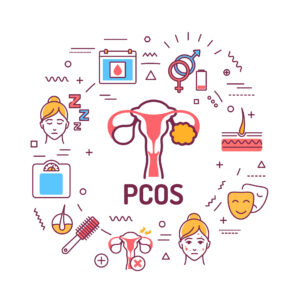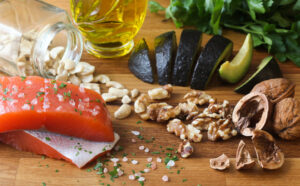Erica Smolinski, MS, RDN, CDN
Nutrition for PCOS_FFHA
 Overview
Overview
Polycystic Ovary Syndrome (PCOS) affects 6% to 18% of reproductive aged women in the United States. However, the name can be misleading. PCOS is a complex and highly prevalent reproductive, endocrine, and metabolic disorder.
Patients with PCOS may experience:
- reproductive abnormalities
- inflammation correlated with insulin resistance
- irregular or absent menstrual periods
- excess androgens (male hormones such as testosterone)
- polycystic ovaries resulting from the hormonal imbalances
- hirsutism (male-patterned hair growth)
- acne
- alopecia (thinning or loss of scalp hair)
Additionally, both reproductive-age and older women with PCOS have an increased risk for conditions such as:
- impaired glucose tolerance
- type 2 diabetes mellitus
- elevated cholesterol or lipids
- increased abdominal adiposity
- obesity
- hypertension
- metabolic syndrome
- depression
- anxiety
- obstructive sleep apnea
- nonalcoholic fatty liver disease
- endometrial cancer
- cardiovascular disease
Research suggests that medication alone might not be enough to address PCOS. This is where individualized, evidenced-based Medical Nutrition Therapy (MNT) obtained from a Registered Dietitian Nutritionist comes into play.
 Symptoms of PCOS
Symptoms of PCOS
Early diagnosis, intervention, and treatment is key for PCOS patients. So where do you start? It’s important to recognize common signs and symptoms of PCOS, such as:
- Excessive abdominal weight (waist > 35 inches)
- Difficulty losing weight despite diet and exercise
- Heavy bleeding or frequent periods
- Irregular periods or no periods at all
- Intense carbohydrate cravings
- Hypoglycemic (low sugar) episodes and/or the need to eat frequently
- Excessive hair growth on face, chest, stomach, back or toes
- Hair loss from head (male pattern)
- Acne
- Acanthosis nigricans (dark, dry patches of skin)
Interventions for PCOS
Diet Changes
Diet and lifestyle changes are important first-line treatments for PCOS. We know that in nutrition one size does not fit all. However, nutrition interventions for PCOS can support regular menstrual function, regulate hormone levels, and improve other symptoms. They can also help maintain healthy weight and prevent long-term complications.
This can be achieved with:
- Individualized diets based on the goal of weight maintenance, weight gain, or weight loss
- For weight loss, gradual and healthy weight loss is important.
- Reducing excess intake of fats and carbohydrates
- Eating 4-5 meals/snacks per day
A weight loss of five to ten percent of total body weight over the initial 6 months has been shown to improve issues associated with PCOS. Types and quality of food should also include anti-inflammatory foods, such as:
- cold-water fish
- olive oil
- avocados
- red wine
- dark chocolate
- soluble and insoluble fiber, like whole grains, fruits, vegetables, beans, legumes, nuts, and seeds
- pomegranates
- onions
- garlic
 Additionally, it has been shown that zinc deficiencies are related to worsening symptoms. Dietary sources of zinc include meat, liver, fish, eggs, oysters, nuts, and pumpkin and sesame seeds.
Additionally, it has been shown that zinc deficiencies are related to worsening symptoms. Dietary sources of zinc include meat, liver, fish, eggs, oysters, nuts, and pumpkin and sesame seeds.
Supplements
There are three key therapeutic dietary supplements for PCOS: Inositol, Berberine, and L-Carnitine.
- Inositol – Inositol is a vitamin-like substance. It is found in many plants and animals. Research shows that taking inositol reduces fasting blood glucose, fasting insulin, total cholesterol, triglycerides, and testosterone levels. Another study showed myo-inositol is similarly effective to Metformin for improving fasting insulin, insulin resistance, androgen levels, and body mass index (BMI), but with a much lower risk for adverse effects.
- Berberine – Berberine’s lipid-lowering and insulin-resistance improving actions have been demonstrated in numerous randomized clinical trials. Research shows that berberine may improve some metabolic characteristics in PCOS patients and insulin resistance. Berberine seems to improve lipid parameters, including LDL cholesterol and total cholesterol, when compared with Metformin.
- L-Carnitine – L-carnitine is an amino acid that is produced in the body. L-carnitine helps the body turn fat into energy. L-Carnitine supplementation reduces body weight, BMI, waist circumference, and hip circumference when compared with placebo in women with PCOS. There were also noted improvements in markers of glycemic control and insulin sensitivity.
Other Therapies
Regular mindful yoga practice can be a useful complementary therapeutic option for people with PCOS, particularly for improving serum androgen levels. Yoga practices can help with anxiety and depression as well. Overall, the Academy of Nutrition and Dietetics recommends a goal of 30 minutes or more of moderate intensity physical activity daily.
There are numerous other therapies and dietary supplements studied for PCOS treatment but they all have insufficient reliable evidence, and therefore I would proceed with caution.
Additionally, collaboration with a team of healthcare professionals is so important for people with PCOS. Patients should seek out a multidisciplinary team, including a nutrition professional and a mental health professional. It is so important to be advocating for yourself on your journey to healing by requesting copies of your routine lab work to be able to discuss the results with your doctor. That way you will be able to monitor the effectiveness of your treatment plan and hard work while educating and empowering yourself along the way!
Take Home Points
- PCOS is a highly complex and prevalent reproductive, endocrine, and metabolic disorder that needs to be detected and treated as early as possible to mitigate long-term complications
- Diet and physical activity should be the first line nutrition intervention for polycystic ovary syndrome (PCOS). Weight loss of 5% to 10% of total body weight has been shown to improve both metabolic and reproductive aspects of PCOS.
- Physical activity level should be assessed and individualized long-term goals should be established to accumulate at least 30 minutes or more of moderate-intensity physical activity on most—preferably all—days of the week, unless medically contraindicated. Physical activity contributes to weight loss, may decrease abdominal fat, and may help with maintenance of weight loss
- Berberine, Inositol, and L-Carnitine rank highest in the literature as the most effective therapeutic dietary supplements for PCOS
References
- An Y, Sun Z, Zhang Y, Liu B, Guan Y, Lu M. The use of berberine for women with polycystic ovary syndrome undergoing IVF treatment. Clin Endocrinol (Oxf) 2014;80(3):425-31.
- Arentz S, Smith CA, Abbott J, Bensoussan A. Nutritional supplements and herbal medicines for women with polycystic ovary syndrome; a systematic review and meta-analysis. BMC Complement Altern Med. 2017;17(1):500.
- Cicero AF, Baggioni A. Berberine and Its Role in Chronic Disease. Adv Exp Med Biol. 2016;928:27-45. doi:10.1007/978-3-319-41334-1_2
- Colazingari S, Treglia M, Najjar R, Bevilacqua A. The combined therapy myo-inositol plus D-chiro-inositol, rather than D-chiro-inositol, is able to improve IVF outcomes: results from a randomized controlled trial. Arch Gynecol Obstet 2013;288(6):1405-11.
- Cooney LG, Dokras A. Beyond fertility: polycystic ovary syndrome and long-term health. Fertil Steril. 2018;110(5):794-809. doi:10.1016/j.fertnstert.2018.08.021
- El Sharkwy I, Sharaf El-Din M. l-Carnitine plus metformin in clomiphene-resistant obese PCOS women, reproductive and metabolic effects: a randomized clinical trial. Gynecol Endocrinol 2019;35(8):701-5. doi: 10.1080/09513590.2019.1576622.
- El Sharkwy IA, Abd El Aziz WM. Randomized controlled trial of N-acetylcysteine versus l-carnitine among women with clomiphene-citrate-resistant polycystic ovary syndrome. Int J Gynaecol Obstet 2019;147(1):59-64. doi: 10.1002/ijgo.12902.
- Facchinetti F, Orrù B, Grandi G, Unfer V. Short-term effects of metformin and myo-inositol in women with polycystic ovarian syndrome (PCOS): a meta-analysis of randomized clinical trials. Gynecol Endocrinol 2019;35(3):198-206
- Fruzzetti F, Perini D, Russo M, Bucci F, Gadducci A. Comparison of two insulin sensitizers, metformin and myo-inositol, in women with polycystic ovary syndrome (PCOS). Gynecol Endocrinol. 2017;33(1):39-42.
- Gordon, Barbara MBA, RDN, LD; Agresta, Eleni MS, RDN; Keenan Isoldi, Kathy PhD, RDN; Vargas-Rodriguez, Ileana MD, MS Medical Nutrition Therapy for Women With Polycystic Ovary Syndrome—Does One Size Fit All? A Narrative Review on Dietary Treatment for Adolescents and Young Adults, Topics in Clinical Nutrition: January/March 2020 – Volume 35 – Issue 1 – p 71-90 doi: 10.1097/TIN.0000000000000196
- Ismail AM, Hamed AH, Saso S, Thabet HH. Adding L-carnitine to clomiphene resistant PCOS women improves the quality of ovulation and the pregnancy rate. A randomized clinical trial. Eur J Obstet Gynecol Reprod Biol 2014;180:148-52.
- Kamenov Z, Kolarov G, Gateva A, Carlomagno G, Genazzani AD. Ovulation induction with myo-inositol alone and in combination with clomiphene citrate in polycystic ovarian syndrome patients with insulin resistance. Gynecol Endocrinol 2015;31(2):131-5.
- Latifian S, Hamdi K, Totakneh R. Effect of addition of l-carnitine in polycystic ovary syndrome (PCOS) patients with clomiphene citrate and gonadotropin resistant. Int J Curr Res Acad Rev 2015;3:469-76.
- Lizneva D, Suturina L, Walker W, Brakta S, Gavrilova-Jordan L, Azziz R. Criteria, prevalence, and phenotypes of polycystic ovary syndrome. Fertil Steril. 2016;106(1):6-15. doi:10.1016/j.fertnstert.2016.05.003
- Mendoza N, Diaz-Ropero MP, Aragon M, et al. Comparison of the effect of two combinations of myo-inositol and D-chiro-inositol in women with polycystic ovary syndrome undergoing ICSI: a randomized controlled trial. Gynecol Endocrinol. 2019 Aug;35(8):695-700.
- Moran LJ, Pasquali R, Teede HJ, Hoeger KM, Norman RJ. Treatment of obesity in polycystic ovary syndrome: a position statement of the Androgen Excess and Polycystic Ovary Syndrome Society. Fertil Steril. 2009;92(6):1966- 1982.
- Nestler JE, Jakubowicz DJ, Reamer P, et al. Ovulatory and metabolic effects of D-chiro-inositol in the polycystic ovary syndrome. N Engl J Med 1999;340:1314-20.
- Nordio M, Proietti E. The combined therapy with myo-inositol and D-chiro-inositol reduces the risk of metabolic disease in PCOS overweight patients compared to myo-inositol supplementation alone. Eur Rev Med Pharmacol Sci 2012;16(5):575-81.
- Patel V, Menezes H, Menezes C, Bouwer S, Bostick-Smith CA, Speelman DL. Regular Mindful Yoga Practice as a Method to Improve Androgen Levels in Women With Polycystic Ovary Syndrome: A Randomized, Controlled Trial [published online ahead of print, 2020 Apr 14]. J Am Osteopath Assoc. 2020;10.7556/jaoa.2020.050. doi:10.7556/jaoa.2020.050
- Pizzo A, Laganà AS, Barbaro L. Comparison between effects of myo-inositol and D-chiro-inositol on ovarian function and metabolic factors in women with PCOS. Gynecol Endocrinol 2014;30(3):205-8.
- Samimi M, Jamilian M, Ebrahimi FA, Rahimi M, Tajbakhsh B, Asemi Z. Oral carnitine supplementation reduces body weight and insulin resistance in women with polycystic ovary syndrome: a randomized, double-blind, placebo-controlled trial. Clin Endocrinol (Oxf) 2016;84(6):851-7.
- Tagliaferri V, Romualdi D, Immediata V, et al. Metformin vs myoinositol: which is better in obese polycystic ovary syndrome patients? A randomized controlled crossover study. Clin Endocrinol (Oxf). 2017;86(5):725-30.
- Wei, W., Zhao, H., Wang, A., Sui, M., Liang, K., Deng, H., Ma, Y., Zhang, Y., Zhang, H., and Guan, Y. A clinical study on the short-term effect of berberine in comparison to metformin on the metabolic characteristics of women with polycystic ovary syndrome. Eur J Endocrinol. 2012;166(1):99-105
Author Information

Erica Smolinski, MS, RDN, CDN is a registered dietitian nutritionist, specializing in integrative and functional nutrition. Erica received her combined Bachelor and Master of Science Degree in Dietetics from D’Youville College. She works for Buffalo Nutrition and Dietetics, PLLC, specializing in gastrointestinal and pediatric nutrition, out of their Sterling Medical Center office in Orchard Park, NY. www.buffalo-nutrition-and-dietetics.com
No conflicts of interest to report.






